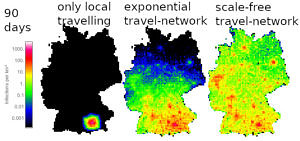Different travel scenarios
Simulations of the spread of Covid-19 for different travel scenarios
 By using spatially-resolved SEIR-simulations we study the spread of Covid-19 in Germany for different travel scenarios. The fast initial spread of Covid-19 only can be explained by frequent long-distance travelling that is modeled in our simulations with an underlying scale-free travel network. In contrast, if travelling is restricted to local travel, the spread can be confined in a certain region. Even if typical commuting is allowed it takes a long time for the spread to affect Germany as a whole. However, our simulations also show that during the initial growth the total number of infected persons cannot be changed by travel restrictions if other restrictions are absent.
By using spatially-resolved SEIR-simulations we study the spread of Covid-19 in Germany for different travel scenarios. The fast initial spread of Covid-19 only can be explained by frequent long-distance travelling that is modeled in our simulations with an underlying scale-free travel network. In contrast, if travelling is restricted to local travel, the spread can be confined in a certain region. Even if typical commuting is allowed it takes a long time for the spread to affect Germany as a whole. However, our simulations also show that during the initial growth the total number of infected persons cannot be changed by travel restrictions if other restrictions are absent.
In future, we want to characterize typical patterns of the spread of Covid-19 in order to understand how these patterns are related to the travel behavior. Furthermore, we want to employ artificial intelligence to analyze these patterns.
